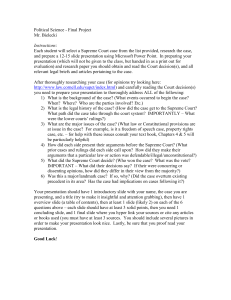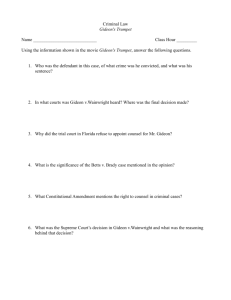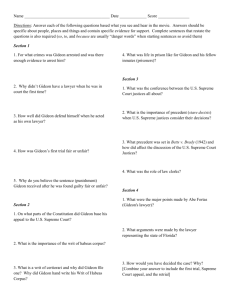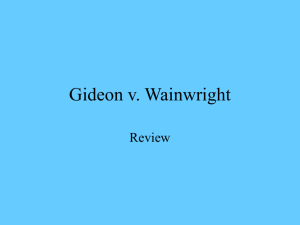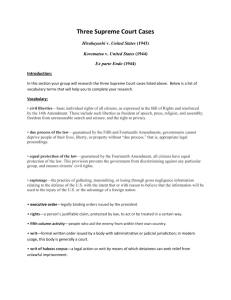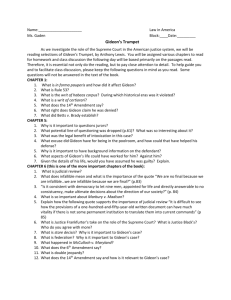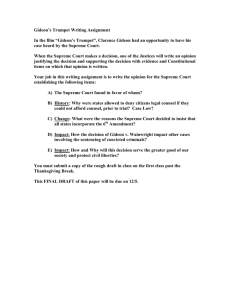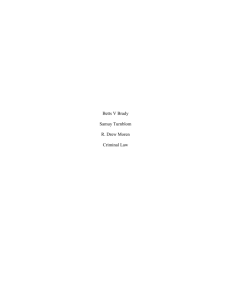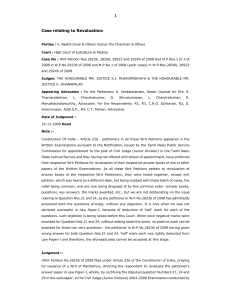Vocabulary * Gideon*s Trumpet
advertisement
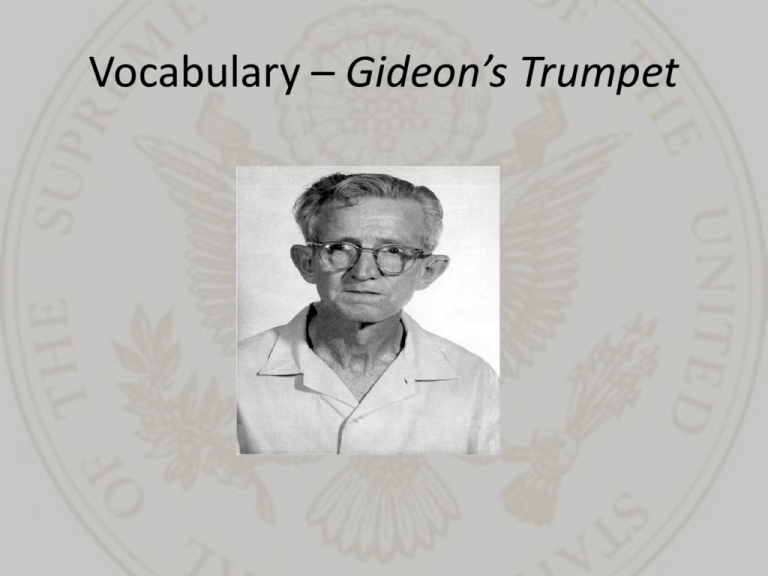
Vocabulary – Gideon’s Trumpet What’s in a name? Gideon’s Trumpet • The name is a play on words, using the defendant's last name and invoking the biblical story in which Gideon ordered his small force to attack a much larger enemy camp. Gideon's army carried trumpets and concealed torches in clay pots. When the call to attack came, the noise and light they made tricked their enemies into thinking that a much larger army was attacking them. Thus, Gideon won the battle with little actual fighting (Judges 7:16-22). Indigent • lacking food, clothing, and other necessities of life because of poverty; needy; poor; impoverished. Felony • an offense, as murder or burglary, of graver character than those called misdemeanors, especially those commonly punished in the U.S. by imprisonment for more than a year Habeas Corpus • a writ requiring a person to be brought before a judge or court, especially for investigation of a restraint of the person's liberty, used as a protection against illegal imprisonment. Writ of Certiorari • a writ issuing from a superior court calling up the record of a proceeding in an inferior court for review. Due Process • the regular administration of the law, according to which no citizen may be denied his or her legal rights and all laws must conform to fundamental, accepted legal principles, as the right of the accused to confront his or her accusers. Affidavit • a written declaration upon oath made before an authorized official. In Forma Pauperis • Lat. 'in the form of a pauper.' Someone who is without the funds to pursue the normal costs of a lawsuit or criminal defense. Upon the court's granting of this status the person is entitled to waiver of normal costs and/or appointment of counsel (but seldom in other than a criminal case). • It can also refer to a petition filed by a poor person in order to proceed in court without having to pay court costs such as filing fees. In most civil cases it does not cover other cost such as those involved in discovery (depositions, witness fees, court reporters, etc.) and service of process, except in rare cases. Also, barring exceptional circumstances such as some civil rights suits, it does not cover attorney appointments Betts v. Brady 1943 • • • • Facts:- The petitioner was indicted for robbery. He was unable to afford a counsel and he asked the court to assign one for him. The court ruled that it was not the it's duty to provide the defendant with a counsel, unless he was involved in a rape or murder case. The defendant was found guilty and was sentenced to 8 years in prison. The petitioner filed for writ of habeas corpus arguing that his 14th Amendment rights were violated. Issue:- Did the 6th and 14th Amendments provide the petitioner with the right to a counsel? Holding:- No Reasoning:- The due process clause does not enforce it upon the states to provide counsels for defendants in every type of criminal case. According to the court, "... in the great majority of the States, it has been the considered judgement of the people, their representatives and their courts that appointment of counsel is not a fundamental right, essential to a fair trial." Furthermore, the petitioner was familiar with the criminal justices system, having been convicted of a crime before. He also waived his right to a jury trial and his trial was conducted by a judge, which favors the petitioner as far as the fairness of the trial is concerned. So it can not be determined that the 14th Amendment provided the petitioner the right to a counsel and without which, a fair justice was not served to him. Affirmed. Scottsboro Case • Scottsboro Case. In 1931 nine black youths were indicted at Scottsboro, Ala., on charges of having raped two white women in a freight car passing through Alabama. In a series of trials the youths were found guilty and sentenced to death or to prison terms of 75 to 99 years. The U.S. Supreme Court reversed convictions twice on procedural grounds (that the youths' right to counsel had been infringed and that no blacks had served on the grand or trial jury). At the second trial one of the women recanted her previous testimony. The Alabama trial judge set aside the guilty verdict as contrary to the weight of the evidence and ordered a new trial. In 1937 charges against five were dropped and the state agreed to consider parole for the others. Two were paroled in 1944, one in 1951. When the fourth escaped (1948) to Michigan, the state refused to return him to Alabama. In 1976, Alabama pardoned Clarence Norris, who had broken parole and fled the state in 1946. The belief that the case against the “Scottsboro boys” was unproved and that the verdicts were the result of racism caused 1930s liberals and radicals to come to the defense of the youths. The fact that Communists used the case for propaganda further complicated the affair. Rule of Four • The rule of four is a custom of the United States Supreme Court which dictates that if four justices decide that a case is worthy of being heard, the Court will agree to hear it. The rule of four is designed to ensure that the court's majority cannot control which cases are heard, as without the rule of four, the minority justices might find themselves unable to try cases of interest. • This custom was first adopted in 1891, and made public in 1924. The rule of four does not appear anywhere in the official rules of protocol for the Supreme Court, but it is taken to be official because it has been practiced for so long. For members of the public, the rule of four is an assurance that their cases have a chance to be heard before the Supreme Court, regardless as to who is dominating it at any particular time. • The process of getting a case heard before the Supreme Court is quite complex. The justices review over 7,000 applications each year, and only agree to hear a handful of these cases. As a general rule, the applications take the form of a request for a writ of certiorari, a court order which requests lower courts to send documents and materials relating to the case to the Supreme Court.
